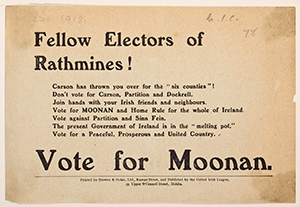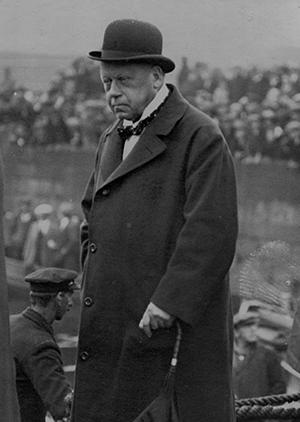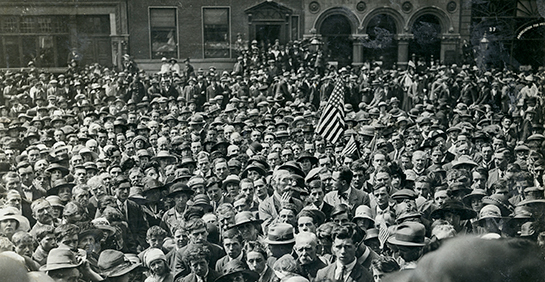SOUTHERN UNIONISM: ‘A Unionist under duress’—the political life of Sir Maurice Dockrell
Published in Features, Issue 1 (January/February 2021), Volume 29A colourful public figure who deserves more than consignment to historical obscurity.
By Jack McGarry
Events commemorating the first sitting of Dáil Éireann rightly celebrated the seminal importance of that historic day. Sinn Féin’s landslide victory heralded a momentous change in Irish society. An imperfect yet independent and democratically elected government had been formed in Ireland. While the story of Sinn Féin’s rise has been extensively documented, there is one individual who has remained largely absent from such historical examinations. Although the public had overwhelmingly endorsed a more radical form of Irish nationalism at the ballot, there was nonetheless a notable outlier amongst the elected candidates: Sir Maurice Dockrell, who was elected in a constituency only a short walk from Sinn Féin’s Harcourt Street headquarters.

Above: Handbill seeking support for United Irish League (IPP) candidate George Moonan in the general election of December 1918. Sinn Féin also stood a candidate in Rathmines, splitting the nationalist vote, allowing Dockrell to be the only Unionist elected outside of Ulster and Trinity College Dublin. (NLI)
Dockrell ran successfully on a Unionist ticket in the south Dublin suburb of Rathmines. A well-known businessman and active member of the Irish Unionist Alliance, he had previously run unsuccessfully in the general election of 1885 in the constituency of St Patrick’s. On that occasion he lost out to another notable magnate, William Martin Murphy. Since, however, the Irish Parliamentary Party (IPP) fielded a candidate to compete with Sinn Féin, the 1918 general election saw the nationalist vote split in Rathmines. As a result, Dockrell won the seat.
Far from being an archetypal conservative or a clone of Carson, Dockrell, as evidenced by his statements in the House of Commons, proved to be a maverick representative. A perusal of his public utterances and parliamentary contributions from his tenure as an MP reveals an open-minded Unionist who was unusually sympathetic to the republican cause.
Prior to his election, Dockrell had been the head of one of the main builders’ provisioning firms in Ireland. He was a prominent figure in the southern unionist community, serving as chairman of the City of Dublin Recruiting Committee during the First World War. His ideological trajectory provides a fascinating insight into the complexities inherent within unionism in late nineteenth- and early twentieth-century Ireland.
1885 general election and support for the Union

Sir Maurice Dockrell shortly before his death in August 1929. (Dockrell family)
Sir Maurice’s first foray into politics was a failure. On 20 November 1885, the Freeman’s Journal reported on a raucous meeting in support of Dockrell. Struggling to be heard over a barrage of ‘groans, hisses, cat-calls and whistling’, not to mention sporadic outbursts of God Save the Queen and God Save Ireland, Dockrell described the Irish Parliamentary Party as a collection of ‘howling, rampaging agitators’.
His opponents, meanwhile, at a meeting endorsing William Martin Murphy, declared Dockrell an enemy of the people, a man who ‘maintained the existence’ of ‘an unjust and iniquitous Legislature’ in Ireland through his support for the Union. Edmund Dwyer Gray, the IPP candidate in St Stephen’s Green, even hinted that Sir Maurice was putting himself forward to promote his business interests. Gray remarked that Dockrell’s name ‘would not be forgotten when a bit of painting or plumbing came to be done’. Although it would be over 30 years before Dockrell would enter politics again, he did not disappear from public life.
A report from April 1910 on the annual meeting of the council of the Irish Unionist Alliance records the uncompromising views of those in attendance. Dockrell’s own pronouncements toed the party line—that of virulent opposition to Home Rule. He accused Herbert Asquith of placating John Redmond for political gains, mocking what he saw as the prime minister’s desperation to hold on to power at all costs. He believed Asquith had dragged ‘the Throne into the mire’ and undermined the constitution, sentiments which reportedly elicited much laughter from his peers.
Fighting for a just cause
The enthusiasm with which he embraced his role in recruiting Irishmen to fight in the First World War reverberated through Dockrell’s numerous appeals for Irish conscripts. He was in ‘no doubt’ that the Allies would be victorious. He condemned ‘those miserable poltroons who talked pro-German nonsense about pro-German friendship for Ireland’. His disdain for nationalist courting of Germany was clear.
Dockrell’s seemingly traditional unionist outlook was ever-present in his political activities and energetic recruitment drives for the war effort, but one interesting incident during the Easter Rising was later recalled by Aguistin MacGiolla Íosa, brother-in-law of William Breen, a captain with the Irish Volunteers at the time. MacGiolla Íosa’s account suggests that Dockrell had a fundamental respect for his countrymen of the opposite political persuasion. Breen, an electrical engineer employed by Dockrell, was interned after the Rising. Upon his release he returned to work, whereupon ‘the heads of the various departments and other employees went as a deputation’ to Dockrell, telling him that they would no longer work with Breen. Dockrell replied ‘that Breen fought according to his colour and they themselves were able-bodied men’ who should have been ‘in khaki fighting at the front’. He made it clear that ‘if they did not want to work in the same firm as Breen, they knew their way out’. Dockrell’s leniency towards his rebellious employee is particularly striking considering that his own business did not emerge unscathed from the disruption that ensued in the wake of the Rising. Documents from this time reveal compensation claims made by Dockrell for damages and materials looted at his premises on Henry Street and Sir John Rogerson’s Quay.
An independent path
In August 1917, Dockrell resigned his membership of the Irish Unionist Alliance in what appears now as a prelude to his gradual drift away from traditional unionism. Although he was a member of the Ulster Unionist group in parliament from February 1919, his independent streak was frequently on show. Unionist opposition to proportional representation didn’t stop him supporting the government’s bill. He argued that its introduction would have resulted in at least one more Unionist politician representing Dublin in Westminster. He now found himself on the opposite side from Carson, who launched an ‘emphatic protest’ against the measure.
Indeed, as Padraig Yeates has argued, Dockrell spent much of his time in parliament championing issues that were mainly the domain of Irish nationalists. One such instance was his working with IPP MP William Redmond to secure additional coal supplies for Ireland after imports from Britain declined in the wake of the First World War. Dockrell believed that his views were echoed ‘by a good many thousands of Catholics of moderate opinion’. He explained that he
‘… was sent into this Parliament giving three pledges. One was that I would consent to no partition of Ireland. The second was that I would not consent to any coercion of Ulster, and the next was that I would consent to no Parliament for the whole of Ireland that did not include Ulster. I represent in this House about one-tenth of the entire population of Ireland, and therefore you can see that my voice is not negligible, and the reason why the people who sent me here object to this Bill is that it consigns them to a permanent inferiority, whereas we could, we believe, in a Parliament of the whole country achieve considerable results.’
Appeals to the North
In parliament, Dockrell implored Northern unionists ‘to take their place with their colleagues and with their co-religionists the minority in the South of Ireland’. He was convinced that by doing so there would exist ‘an Opposition in Ireland such as you have not in this House—a more powerful and efficient Opposition’. He appealed to them not only ‘for their sympathy’ but also for practical financial help in administering a self-governing Ireland. He asked ‘his honourable friends from the North at some stage, and very soon, to come in and join us in Ireland. With their help we can achieve great things in Ireland. We have taken risks in the South that they have not taken.’
An immediate Ulster unionist riposte came from Sir Robert Lynn, who accused Dockrell of siding with Sinn Féin, the hands of whose members ‘were dripping with the blood of our friends’. Lynn dismissed any notion that Ulster unionists were going to join the South’s parliamentary embrace. Such combative words were illustrative of the fault lines that ran through Irish unionism at the time. Dockrell remained undeterred by disapproving voices such as Lynn’s and continued to appeal for rapprochement between nationalists and unionists.
Imperial realities
The realities of London quickly darkened the once-committed unionist’s view of British governance in Ireland. An increasing pessimism began to appear in Dockrell’s words when addressing the subject over the course of his parliamentary career. During one sitting, he rather diplomatically expressed his belief that, ‘owing to the enormous burdens of Empire, there are many questions affecting Ireland for which it is impossible to get a sympathetic hearing’. He asserted that it ‘would be impossible for us to be in a worse condition than we have been in, and we may easily be in a very much better position’, and appealed ‘with all the emphasis I can that this Agreement [the Anglo-Irish Treaty of 1921] may have its reward in a happy and contented Ireland’.
Despite quickly coming to believe that Westminster ‘was no place for an Irishman’, Dockrell retained a mischievous sense of humour. On one occasion, his feelings of alienation were the result of the rather apolitical question of a billiard and card room for parliamentarians, which he had placed on the day’s notice paper. He irreverently gave as his reason for such a request that it would provide some relief for MPs from the ‘hot air’ of the chamber. To his dismay, his words were changed by the clerk to ‘heated atmosphere’. The first commissioner of works then proceeded to respond to the question ‘with great solemnity’, treating it as ‘an attack on the highly expensive and elaborate ventilation system’ in use. Sir Maurice mused in the lobby that there was simply something wrong ‘with the English outlook’. He reportedly spoke ‘more in pity than annoyance’ and, referring to his po-faced English colleagues, simply remarked, ‘God help them’.
Peace talks
On 4 July 1921 Dockrell was part of a delegation representing the unionists and Protestants of Ireland, alongside Lord Middleton, Sir Robert Woods and Andrew Jameson, which met with Eamon de Valera. These talks were intended to facilitate a lasting peace in Ireland. The sense of hope engendered by these discussions can be felt in a contemporary report which opined that they had taken place ‘in evident consonance with a new spirit that had come over Ireland’. The excitable author even believed that they had ‘led to a certain fraternization in the streets between the opposing parties’. Just five days after these meetings began, a truce was signed in the Mansion House, which took effect on 11 July at 12 noon.
The meetings appear to have left quite a mark on Dockrell. Having ‘sat with them for some days’, he professed his faith in Sinn Féin’s ability to govern the Irish nation. In December 1921 he voiced his ‘every confidence … that Irishmen will prove themselves capable of conducting their affairs, commercially and otherwise, in such a way as to make for increased prosperity in Ireland’. He also criticised the violence unleashed by republican and Crown forces in Ireland. He painted a grim picture of the chaos on the streets of Dublin, expressing his revulsion at the British threat to bring order ‘by fire and sword’. His ‘three years in the Imperial Parliament’ had shown him ‘that Irish affairs do not receive at the hands of the Government of the day the sympathetic treatment to which they are entitled’. No longer was he excusing the neglect of Ireland by a benign, well-intentioned Empire.
Hope for the future
His desire to see the northern counties integrated into a self-governing island was again on display when he affirmed his belief that ‘the Catholic minority in the North would find its affinities with Catholics in the South, and that the Protestant minority in the South would find its affinities with the Protestants in the North’. He reiterated his belief that this would result in a more effective opposition being formed in Ireland, in contrast to what he saw as an ineffective, unbalanced one in London.
While Dockrell’s insistence that there would be frictionless trade between England and Ireland in the coming years, along with his wish to see the North and South of the country unite as a self-governing entity, could be dismissed as naive, the idealistic and conciliatory nature of his words is unique in the context of the time. Despite London’s Morning Post disparaging his views as those of a ‘Unionist under duress’, Dockrell remained steadfast in his belief that Ireland would prosper with independence, stating that he was ‘proud to live and die in the new Irish Free State’.
The changing tone of Dockrell’s public discourse was emblematic of a Southern unionist élite who found themselves amid a volatile, shape-shifting political landscape. While his rhetoric reflected a pragmatic political mind, it cannot be dismissed as merely cynical self-preservation. During his time as an MP, Dockrell proclaimed to be an Irishman ‘who dearly loved his country’. Such pronouncements can be easy to dismiss as empty grandstanding. Nevertheless, he managed to avoid the fanaticism that dogged so much of post-war European politics and demonstrated an understated courage by eschewing the often-incendiary rhetoric of his contemporaries. As such, his colourful life as a public figure, businessman and politician warrants further evaluation. He deserves more than consignment to historical obscurity.

Above: A crowd outside Dublin’s Mansion House awaiting word of truce negotiations in July 1921. Dockrell was inside, along with Lord Middleton, Sir Robert Woods and Andrew Jameson, representing the unionists and Protestants of Ireland in discussions with Eamon de Valera. (The Graphic, 9 July 1921)
Jack McGarry is a civil servant in the Oireachtas and has an MA in the history of international relations.
FURTHER READING
K. Bowen, Protestants in a Catholic state: Ireland’s privileged minority (Kingston and Montreal, 1983).
P. Yeates, A city in wartime: Dublin 1914–1918 (Dublin, 2011).
















